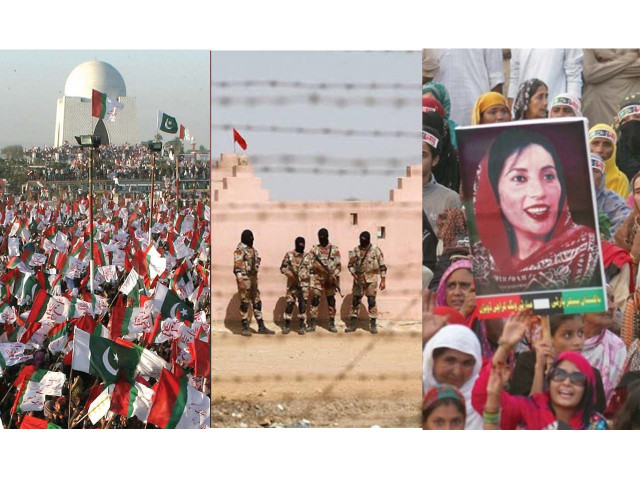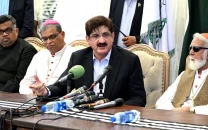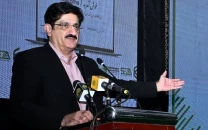A decade in politics: Of seismic shifts and still waters in Sindh
While Karachi has seen a massive reversal of political fortunes, the rest of Sindh remains much the same

PHOTO: FILE

The 2010s have been an interesting era for Sindh. While much of the province seems mired in status quo as we enter a new decade, the political landscape of Karachi has undergone a seismic shift.
For the early half of the outgoing decade, the Muttahida Qaumi Movement, which ruled the city for roughly three decades, had a virtual stranglehold on the country’s economic hub. A series of controversies and internal schisms towards the middle of the decade eroded much of the party’s influence on Karachi politics so much so that by the end of the 2010s, it could only muster a handful of seats in its erstwhile stronghold.
The harder they fall
It all began with an operation launched by the federal government to improve law and order in Karachi in 2013. Prompted by a rise in target-killing, extortion and kidnapping incidents in the city, the then Pakistan Muslim League-Nawaz government carried out a series of crackdowns in the metropolis, many of which targeted the MQM.
In 2015 the MQM’s Nine Zero headquarters were raided twice by the paramilitary Rangers and many top officials of MQM were taken into custody. As they accused the government of ‘political victimisation’, many MQM leaders fled abroad, severely denting the party’s administrative setup.
In August the following year, the party’s founder Altaf Hussain delivered a ‘seditious’ speech, leading law-enforcement authorities to seal its headquarters and other offices, and prompting key leaders to dissociate themselves from the event and creating the splinter MQM-Pakistan under Dr Farooq Sattar.
Amid these events, the return of former Karachi nazim and MQM stalwart Mustafa Kamal along with the party’s former deputy convener Anees Qaimkhani also chipped away the party’s influence. The two not only went on a vocal offensive against the MQM but also formed their own Pak Sarzameen Party (PSP), which despite a lack of success in the 2018 general elections, eroded some of the former party’s support base.
A dispute over ticket allocation during the Senate elections also led to Sattar being pushed out of the faction he founded. As MQM-P elected Dr Khalid Maqbool Siddiqui as its convener, Sattar formed a new faction called the MQM Organisation Restoration Committee.
All this upheaval, however, result in a dismal showing in the 2018 general elections, where the MQM-P managed to secure just four National Assembly seats. In contrast, the MQM had secured all but two of Karachi’s then 19 National Assembly seats in the preceding elections held in 2013. Overall, its share in the lower house of Parliament was 25 seats that year.
Stepping into the void
With Karachi’s pie up for grabs at the outset of the 2018 elections, there was little certainty as to who would emerge in MQM’s stead in the city. To the surprise of many, it would be the Pakistan Tehreek-e-Insaf which would come to the fore as a new force in the city. Without an administrative network, it secured millions of votes from Karachiites and secured 14 out of the city’s 20 National Assembly seats.
However, it wasn’t just the MQM the party challenged in the 2018 elections. PTI’s Abdul Shakoor Shad also defeated PPP Chairman Bilawal Bhutto Zardari in Lyari, long considered the latter party’s stronghold in Karachi. PPP could only muster two National Assembly seats from Karachi while the PML-N failed to penetrate the city entirely.
Status quo in Sindh
Where Karachi underwent a massive political upheaval, the situation in the rest of Sindh remained more or less unchanged throughout the 2010s with PPP still dominating the province.
The party has consistently gained more seats in rural Sindh in all general and local bodies’ elections, defeating all political rivals and individual groups. With the exception of a few, no other party or group has emerged to challenge PPP’s dominance in the province’s rural areas.
In the 2008 General Elections, the PPP secured 90 provincial-assembly seats against 11 seats won by the Pakistan Muslim League-Quaid (PML-Q), eight seats secured by the Pakistan Muslim League Functional (PML-F), three seats nabbed by National Peoples Party (NPP) led by Ghulam Murtaza Jatoi and two seats won by the Awami National Party (ANP). In Karachi, Hyderabad and Mirpurkhas, the MQM bagged around 50 seats.
Although speculations that the political graph of the PPP was plummeting because of bad governance ran rife in the run-up to the 2013 elections, the results revealed the contrary as PPP gained four more seats. PML-Q, instead, was wiped out from the province while PML-F won nine seats, NPP one seat and PML-N, after a gap of 14 years, reemerged on the political landscape by winning seven seats. For the first time, Imran Khan’s PTI won four seats from Karachi, while the MQM retained its position with 50 seats in urban areas of Sindh.
In the 2018 elections, PPP candidates had a tough time winning people’s confidence in a few constituencies where activists, particularly youngsters, finally broke their silence and took to the streets against the poor performance of the party. However, the party relied on electables in various districts and invited them to join the party, promising to give them lucrative positions in the government. As a result, the Shirazi brothers of Thatta, one of the Arbab family members of Tharparkar who has significant influence in the area, Mahar family of Ghotki, Chandio and Magsi tribal chiefs of Qambar-Shahdadkot district and the Malkani of Sujawal, joined hands with the PPP. Resultantly, the party, with the help of electables, won 99 votes as compared to the 94 seats it won in the 2013 elections.
In the last elections, different groups and parties, including Pir Pagara, four former chief ministers of Sindh - Liaquat Jatoi, Arbab Ghulam Rahim, Ghous Ali Shah, and Mumtaz Ali Bhutto, the former home minister Dr Zulfiqar Mirza, Safdar Abbasi and Naheed Khan, Ayaz Latif Palijo of Qaumi Awami Tehreek, the PTI, Murtaza Jatoi of NPP and former home minister Irfanullah Marwat formed the Grand Democratic Alliance (GDA) against the PPP and fielded their candidates on this platform. However, they could only grab 14 seats.
In the same elections, the PTI emerged as the second-strongest political force by winning a chunk of votes from Karachi, with 30 seats. Meanwhile, the vote bank of the MQM shrunk from 50 MPA seats to only 21 seats. Despite a rather unimpressive performance in the elections, the GDA, however, surprised the PPP by defeating its candidate in Bhutto’s stronghold of Larkana wherein Moazam Abbasi won the MPA seat against Nida Khuhro, the daughter of PPP Sindh president Nisar Ahmed Khuhro.
Political observers believe that the PPP has not won the elections because of its performance but it gained victory with the help of electables who have family influence in their constituencies.
“The PPP leadership knows very well that it cannot get the votes on party’s performance, that is why they invested all energies pursuing the feudal lords to join their party,” Ustad Liaquat Mirani, a civil society activist, who also challenged the PPP candidates in Larkana division, told The Express Tribune. “For decades, influential people are contesting the polls and no one has dared to challenge them. Now, people from middle and lower-middle classes have taken interest in electoral politics and they have emerged as the alternative to the feudal system. With the social media awakening, society is being transformed and a time will come when Sindh will get rid of the status quo,” he said.
Published in The Express Tribune, January 1st, 2020.



















COMMENTS
Comments are moderated and generally will be posted if they are on-topic and not abusive.
For more information, please see our Comments FAQ